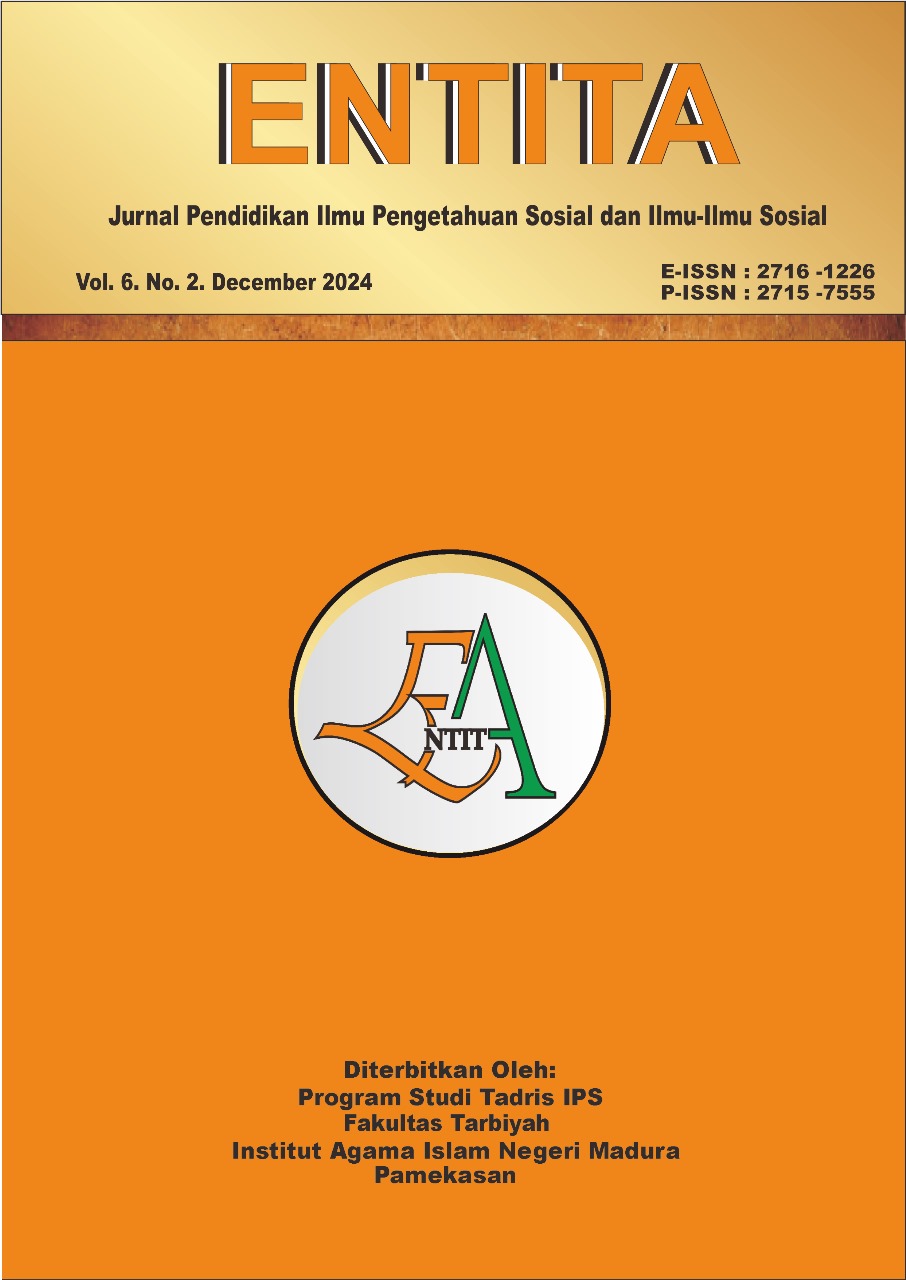Urbanization and Changes in Social Structure Post-Disaster in Palu City
 Abstract views: 120
,
Abstract views: 120
,
 PDF downloads: 72
PDF downloads: 72
Abstract
Post-disaster urbanization in Palu City, triggered by the earthquake, tsunami, and liquefaction in 2018, has significantly impacted the social structure of the community. This study aims to analyze the phenomenon of urbanization and its effects on changes in social class, family patterns, and social solidarity in Palu City, using Auguste Comte's positivistic perspective. A descriptive qualitative approach was employed in this research, with data collected through interviews, field observations, and documentation from primary and secondary sources. The findings reveal that post-disaster urbanization has intensified social class disparities, triggered transformations in family and community structures, and led to a decline in social solidarity within urban environments. These results support Comte's view that society evolves towards a more modern and rational social structure after a disaster, with key roles played by social institutions such as the government and the economic sector. In conclusion, by objectively understanding these dynamics, more effective policies can be designed to manage urbanization processes and mitigate their negative impacts.
Downloads
References
Apostolopoulou, Elia et al. 2021. “Reviewing 15 Years of Research on Neoliberal Conservation: Towards a Decolonial, Interdisciplinary, Intersectional and Community-Engaged Research Agenda.” Geoforum 124: 236–56.
Azzam, Mounir, Valerie Graw, and Andreas Rienow. 2022. “Challenges and Innovations of Real Estate for Achieving Spatial Balance in Post-Disaster Countries.” Land 11(5): 737.
BPS, Sulawesi Tengah. 2020. “Statistik Provinsi Sulawesi Tengah 2020.”
Chabibi, Muhammad. 2019. “Hukum Tiga Tahap Auguste Comte Dan Kontribusinya Terhadap Kajian Sosiologi Dakwah.” NALAR: Jurnal Peradaban Dan Pemikiran Islam 3(1): 14–26.
Daimon, Hiroaki, Ryohei Miyamae, and Wenjie Wang. 2023. “A Critical Review of Cognitive and Environmental Factors of Disaster Preparedness: Research Issues and Implications from the Usage of ‘Awareness (Ishiki)’ in Japan.” Natural Hazards 117(2): 1213–43.
Disnaker, Sulawesi Tengah. 2021. “Laporan Ketenagakerjaan Di Kota Palu Pasca Bencana.”
Djalante, Riyanti, and Matthias Garschagen. 2017. “A Review of Disaster Trend and Disaster Risk Governance in Indonesia: 1900–2015.” Disaster Risk Reduction in Indonesia: Progress, Challenges, and Issues: 21–56.
Fatkhullah, Mukhammad, Muhammad Alhada Fuadilah Habib, and Kanita Khoirun Nisa. 2022. “Identifikasi Dan Manajemen Risiko Untuk Mereduksi Kerentanan Pada Masyarakat.” Ekonomi, Keuangan, Investasi Dan Syariah (EKUITAS) 3(4): 856–67.
Herawati, Nashaihul Honey, and Romi Mesra. 2024. “Fenomena Urbanisasi Di Kota Yogyakarta Sebagai Akar Masalah Sosial.” COMTE: Journal of Sociology Research and Education 1(3): 116–28.
Johnson, L., & Blackburn, S. 2021. “Urban Displacement and Post-Disaster Relocation: Insights from the 2015 Nepal Earthquake.” Environment and Urbanization 33(1): 165–82. https://doi.org/10.1177/0956247820965154.
Lee, J., & Park, H. 2019. “Economic Opportunities and Challenges in Post-Disaster Urban Areas: A Case Study of the 2011 Great East Japan Earthquake.” Urban Studies 56(10): 2059–75. https://doi.org/10.1177/0042098018803250.
Lichter, Daniel T, and David L Brown. 2011. “Rural America in an Urban Society: Changing Spatial and Social Boundaries.” Annual review of sociology 37(1): 565–92.
Maisule, Suleiman Ari, Joseph Bamidele, and Samson Olayemi Sennuga. 2023. “A Critical Review of Historical Analysis of Social Change in Nigeria from the Pre-Colonial to the Post-Colonial Period.” International Journal of Arts, Humanities and Social Sciences 4(4): 73–83.
Morales-Muñoz, Héctor et al. 2020. “Exploring Connections—Environmental Change, Food Security and Violence as Drivers of Migration—A Critical Review of Research.” Sustainability 12(14): 5702.
Oktaviani, Jusmalia, Christy Pavita Kumesan, and Saltiq Fajar. 2017. “Analisis Pemetaan Kerentanan Masyarakat Terhadap Bencana Gempa: Studi Kasus Gempa Di Haiti Tahun 2010.” Sospol 3(1): 42–57.
Pribadi, Krishna S, Dyah Kusumastuti, Saut A H Sagala, and Ramanditya Wimbardana. 2014. “Post-Disaster Housing Reconstruction in Indonesia: Review and Lessons from Aceh, Yogyakarta, West Java and West Sumatera Earthquakes.” Disaster recovery: Used or misused development opportunity: 197–223.
Rahman, M., Ahmed, I., & Smith, K. 2021. “Post-Disaster Urbanization and Informal Sector Employment: A Case Study from Southeast Asia.” World Development 145: 105. https://doi.org/10.1016/j.worlddev.2021.105525.
Save the Children Indonesia. 2020. “Family Adaptation and Child Welfare in Post-Disaster Palu: A Survey Analysis. Save the Children Reports.”
Setiawan, Refly, Stanislav Vladimirov Mladenov, Mustafa Zafer Soydan, and Esti Melinda. 2023. “Kurdish Community Differences: Potential Conflict and Politics in The Middle East.” Entita: Jurnal Pendidikan Ilmu Pengetahuan Sosial dan Ilmu-Ilmu Sosial 5(2): 171–82.
Smith, D., Brown, P., & Jones, K. 2020. “Inequality and Class Dynamics in Post-Disaster Urban Environments.” Disasters 44(4): 763–82. https://doi.org/10.1111/disa.12457.
Sufri, Sofyan et al. 2024. “Progress and Challenges in Implementing the Sendai Framework for Disaster Risk Reduction at Sub-National Levels: Insights from Aceh, Indonesia.” Environmental Hazards: 1–28.
Tanaka, Y., & Imai, T. 2019. “Urban Recovery and Community Cohesion in Post-Disaster Societies: Lessons from Japan.” Progress in Planning 132(3): 100–123. https://doi.org/10.1016/j.progress.2019.100423.
Wamsler, Christine, and Åse Johannessen. 2020. “Meeting at the Crossroads? Developing National Strategies for Disaster Risk Reduction and Resilience: Relevance, Scope for, and Challenges to, Integration.” International journal of disaster risk reduction 45: 101452.
Copyright (c) 2024 Entita: Jurnal Pendidikan Ilmu Pengetahuan Sosial dan Ilmu-Ilmu Sosial

This work is licensed under a Creative Commons Attribution-NonCommercial 4.0 International License.
ENTITA: Jurnal Pendidikan Ilmu Pengetahuan Sosial dan Ilmu-Ilmu Sosial operates an Open Access policy under a Creative Commons Non-Commercial 4.0 International license. Authors who publish with this journal agree to the following terms:
- The copyright of the received article once accepted for publication shall be assigned to the journal as the publisher with licensed under a

- Journal is able to enter into separate, additional contractual arrangements for the non-exclusive distribution of the journal's published version of the work (e.g., post it to an institutional repository or publish it in a book), with an acknowledgement of its initial publication in this journal.
- Journal is permitted and encouraged to post their work online (e.g., in institutional repositories or on their website) prior to and during the submission process, as it can lead to productive exchanges, as well as earlier and greater citation of published work (see The Effect of Open Access).
- Here is Copyright Transfer Form that author can download and send to OJS during submission.

















